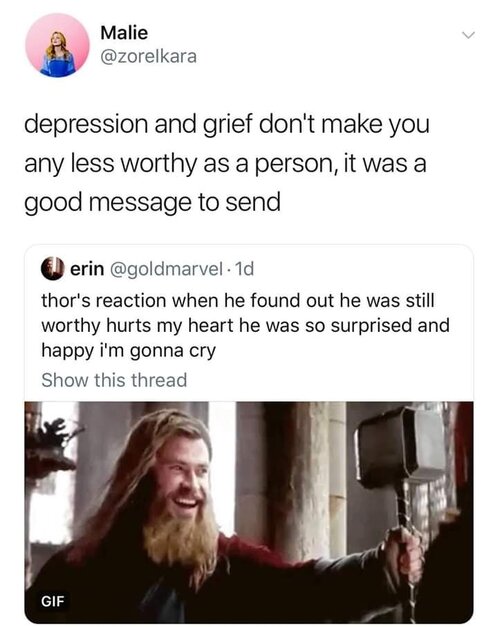What Thor Taught Us about Depression and Self-Worth
Greetings, True Believers!
One thing you should know, for those of you who are just getting to know me through my articles in this blog, is that I am an unabashed fangirl of the Marvel Cinematic Universe (MCU). Within the spectacle and humor of each film, throughout my history of midnight showings and marathons on the couch with my family, I’ve thought about many of the heartfelt and emotion-based themes connected with various characters. So what better way to combine my two loves than to talk about some of the struggles of the god of thunder through the lens of a mental health therapist? Warning: The following post contains spoilers for the movies of the MCU up to and including Avengers: Endgame.
When The Goals Set Aren’t Achieved
The version of Thor we see in Avengers: Endgame is one of the most accurate representations of someone suffering with depression. Throughout various movies we’ve seen Thor attempting to reconcile the hero he feels he is supposed to be with the man he actually is. Avengers: Infinity War guided viewers through a classic hero’s journey for the character with a small but significant twist. Rather than achieving victory in battle, Thor and the rest of our heroes suffer a devastating and unimaginable loss that results in them coming home dramatically changed. This change for Thor is solidified in Endgame’s opening minutes after the remaining team confronts Thanos, only to discover that the destruction of the Infinity Stones, and “The Snap,” is permanent. When Thor replies, “I went for the head,” to Rocket after executing Thanos, you can hear the culmination of emotions – anger, sadness, fear, grief – in his final line before the movie jumps five years into the future.
Fast forward to New Asguard on Rocket and Professor Hulk’s pilgrimage to convince Thor to come back and fight with them, and we expect from their interaction with Valkyrie to find an isolated, sad god with no motivation to do anything. But as they enter his home, Rocket and Professor Hulk are welcomed by a boisterous Thor eating pizza, appearing in party mode alongside his Fortnite playing friends Korg and Miek. The audience isn’t shown an individual exhibiting symptoms that are common misconceptions associated with depression such as sitting alone or crying. What you see is this: Thor doesn’t venture out of his home. He uses alcohol as a coping mechanism for his feelings of guilt, failure and loss of self-worth. And as for his physical health, well Rocket sums it up best: “You look like melted ice cream.” Up to this point, we’ve spent countless movies respecting the passion Thor has for his home, his family, his people, and all life in the universe. In Endgame, we are left with someone who is but a shell of his former self, unsure of who he is, what to do or where to go.




Art Imitates Life
For countless people, this is the true face of depression: a smiling face, hiding or downplaying unhealthy coping mechanisms, denying the existence of a problem. Thor does his best to reassure and deflect his pain from his friends, “I know you think I’m down here wallowing in my pity waiting to be rescued. And saved. I’m fine.” That is why it is crucially important to be able to identify the true, often overlooked signs of depression in yourself and others. Professor Hulk is able to see through Thor’s misdirection because it was a personal struggle he was familiar with, “I get it. You’re in a rough spot. I’ve been there myself. And you want to know who helped me out of it?...It was you. You helped me.” This shows that when you experience depression, how you appear to yourself is not an accurate representation of how the rest of the world views you. When others say they want you around or need your help, they see something in you that your depression may be hindering the ability to see for yourself.
You’re Still Worthy
We see in Thor: Ragnarok the destruction of Mjölnir, the god of thunder’s beloved hammer,which he falsely believes to be the source of his strength and power. At the climax of the third act, Odin appears to Thor and provides some much needed tough love. “Are you Thor, the god of hammers?” he sarcastically inquires to his son who is struggling to realize his inner strength and potential. Dealing with depression can often feel as if we’re struggling with the loss of our own personal Mjölnir. In reality, you are not god of the material things that you may have lost; your true strength lies in the support you draw from loved ones and through seeking professional help.
Thor’s depression is a consistent barrier to achieving his goals, yet when he travels through time and is given the encouragement and opportunity to see if he can summon Mjölnir once again, we can see the hesitation and uncertainty on his face as he braces for the answer. This is what depression is, a learned helplessness and a doubt that you are worthy. Despite his appearance, actions and attitude, he is still the same Thor at heart and he will always be worthy. It’s no different for mortals such as you and me than it is for an Asguardian.
I’ll leave you with this parting inspiration, one of my favorites in the movie that’s given to Thor by his mother Frigga: “That makes you just like everyone else…Everyone fails at who they’re supposed to be, Thor. A measure of a person, of a hero, is how well they succeed at being who they are.” Remember that any mental health issue you may be struggling with doesn’t change who you truly are, and we can succeed in controlling or overcoming these challenges through our support network.
And that is, to channel my inner Stan Lee one more time, “’Nuff said!”
About The Author
Hollie O’Keefe is the founder and lead counselor at Where You Are Counseling. She specializes in college students, care givers, complex illnesses, and major life changes. In addition, Hollie has over a decade of experience in emotional struggles such as anxiety, depression, trauma, loss of motivation, burn out, and apathy. If you are interested in working with Hollie, please contact us at (609) 801-2939 or request a free consultation.

